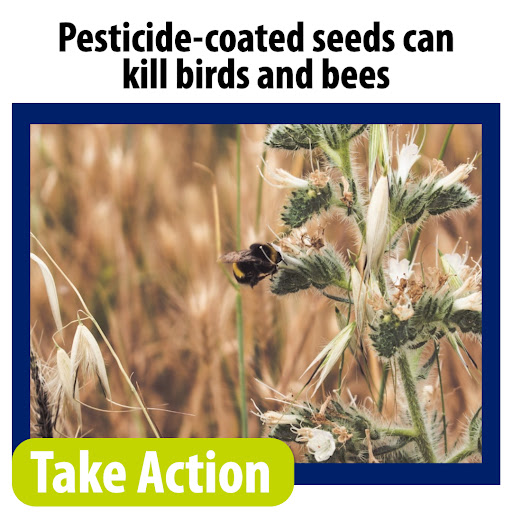

 |
John,
Just one small seed has deadly consequences for birds and bees.
Millions of corn, wheat and soybean seeds are treated with neonicotinoid pesticides -- the same pesticides that paralyze and kill bees. Birds accidentally eat those toxic seeds, which can kill them on the spot.1
Tell Gov. Polis: Ban toxic seeds that kill birds and bees.
Each year, seeds treated with neonicotinoid pesticides are planted on 150 million acres across the country. That's a huge portion of American farmland that poses a threat to pollinators.2
It's a widespread problem -- neonicotinoids or neonics for short are most commonly used on seeds rather than sprayed like other pesticides.
Neonics coated on seeds make the entire plant dangerous for bees. Plus, most of the pesticides on the seeds don't stay put -- 95% gets rubbed off or washed away, contaminating the surrounding environment. That turns a cornfield into a toxic minefield for a tiny bee or a hungry bird.3
During routine farming practices, neonic-laced dust gets churned up. When a bee flies through that toxic dust cloud trying to find its way home, it can be exposed to lethal doses of pesticides. That cloud of pesticides can also drift and land on nearby flowers, harming bees even after the dust has settled.4
Neonic-coated seeds can also kill birds. So many seeds are churning through the farm equipment that piles of them are left by the wayside. A bird sees a delicious free dinner, but doesn't know that it's eating seeds covered in deadly pesticides.
We're working to end the use of neonic-coated seeds here in Colorado. Gov. Polis can work with state agencies to restrict seeds treated with neonic pesticides that kill birds and bees.
Urge our governor to ban neonic-coated seeds.
Thank you,
Ellen Montgomery
1. S.D. Frank and J.F. Tooker, "Neonicotinoids pose undocumented threats to food webs," Proceedings of the National Academy of Sciences (PNAS), September 2, 2020.
2. Elizabeth Royte, "These widely used insecticides may be a threat to mammals too," National Geographic, February 5, 2021.
3. Elizabeth Royte, "These widely used insecticides may be a threat to mammals too," National Geographic, February 5, 2021.
4. "Corn seed treatment insecticides pose risks to honey bees, yield benefits elusive," Purdue University, May 22, 2017.
Donate today. A cleaner, greener future is within our reach. Your donation today can help us bring the vision we share a little closer to reality.
Environment Colorado, Inc.
1543 Wazee St., Suite 400, Denver, CO 80202, (303) 573-3871
Member questions or requests call 1-800-401-6511.
Facebook | Twitter
If you want us to stop sending you e-mail then follow this link -- Unsubscribe